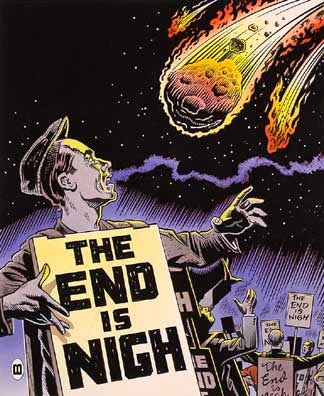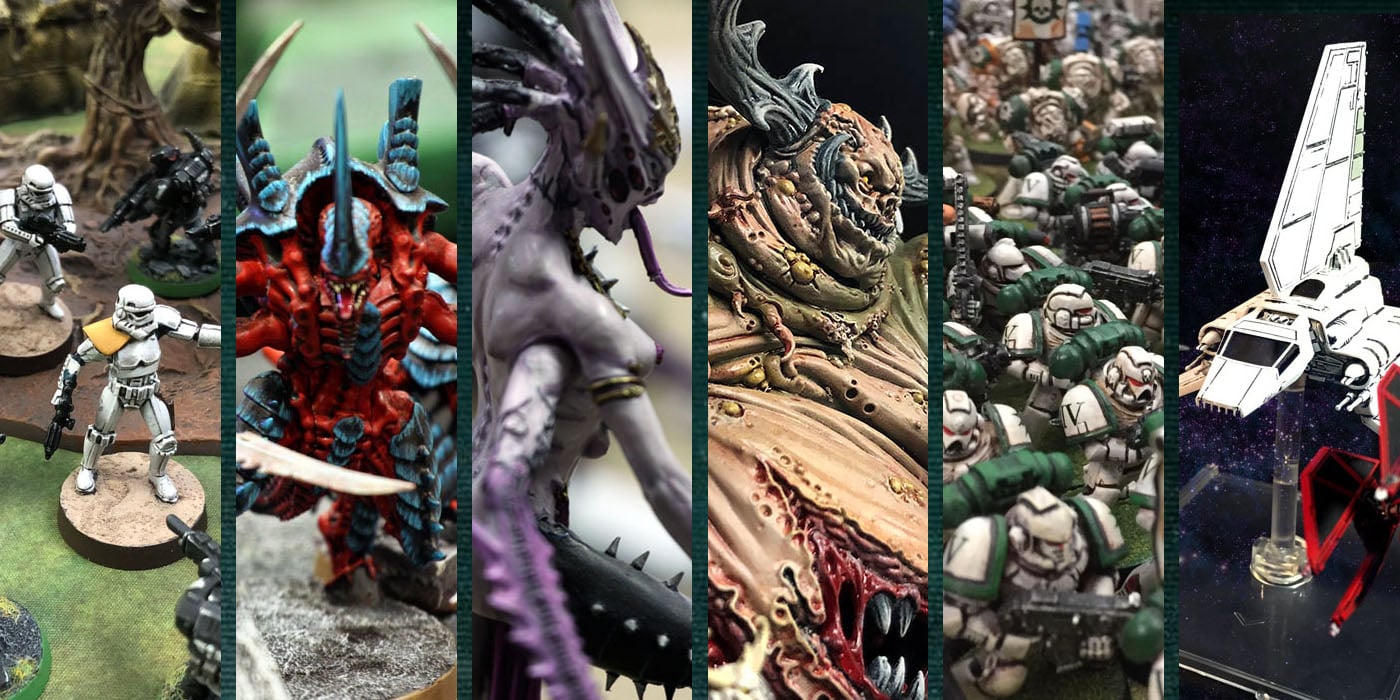EDITORIAL: The End of Competitive 40K

Is Warhammer 40,000 finally reaching the end of the road for competitive play? Here’s what I see…
With the recent datasheets, Escalation, Strongholds, Titans, and crazy netlists, I think competitive 40K is finally going to die. Events and TOs out there have already started making restrictions, rules and banlists to counteract GW’s efforts at making the casual game that it was set out to be. If you look at how the game is designed, how the army books are written, and how the current edition of rules (6th) promotes a cinematic form of gameplay, you will know this game was never meant to be played in a competitive setting. You know what? Good. I hope 40K dies as a competitive game.
Frankly, I don’t know what happened to 40K from 5th edition going into 6th. Out of all the years I’ve played 40K, I’ve sat and watched power armies rise and fall like autumn leaves. Poetic, I know, but shouldn’t this be a clear sign that the books were not designed with balance in mind in the first place? God knows I love game balance, but GW is not a company who makes its money from eSports or tournament players, they make their money from their lore/model fans. As much as GW loves free publicity and marketing provided by these external tournaments, they don’t need it to run their business.
As a widely-labeled competitive player myself, I’m a bit ashamed to see what the meta has turned into. I’m saying this as a player who’s lived through the early days of Nidzilla, Mechdar and Lash Princes to seeing what the game has become now (Taudar, Cronair, Screamerstar). For the older players out there, how are you still enjoying this kind of play? I sincerely hope you’re not and you’ve moved onto greater and better things. For the newer players out there, I tell you this: This is not how the game is supposed to be played. It took me a long time to realize it myself, but once you get out of that repetitive cycle you’ll find yourself having more fun with your hobby.
Truth be told: With all these tournaments out there making up their own rules, it’s only a matter of time before 40K turns into Warhammer ETC. Before you know it, you won’t be playing the same game you started the hobby with, and that’s a sad, sad thing. It divides the community, alienates newer players and kills the hobby for a lot of older players. None of these are a good thing and best way to solve this is not get involved in any competitive circuits.
A friend of mine replied with this:
Hero, I’ve always enjoyed your insight to our hobby, especially your thoughts on the armies we have in common and how they can be competitive.
AdvertisementI’m not going to lie, I’ve had my competitive years in the hobby (my pre marriage/kids years) and I’ve slowly grown out of that and into casual play. I still get the competitive bug now and then, but in the end I’ve always come back to the realization that 40K was designed to be casual and fun. I really have to hand it to Games Workshop, they’ve created an amazing universe full of flavor and depth that has kept me giving them my money year after year. If ever there was a time I took a break from the game it was usually because of something like money, time, or life issues. I’ve never stopped playing because I got board, or because I grew out of it. Granted, I’m still somewhat young and I could still very much grow out of the game, but of all the hobbies I’ve had, Games Workshop has been the most enjoyable.
That being said, I have a lot more respect for you after reading this article. Most competitive players ignore the fact that 40K is a casual game, and GW has said over and over again it wasn’t meant to be competitive. I’ll never fault someone who tries to make 40K into what they enjoy most *glances at the competitive only players*, but I do get a little annoyed when players rage against GW for not taking the game in the direction they want, when GW has stated time and time again their intentions for their product.
On the other hand I do believe 40K can be competitive, but the only way competitive play will stay alive is if a separate format can be universally agree upon (much like what is happening now) that can maintain a level of balance between the armies (something that will never be quite perfect).
To end, I’m excited to see the direction tournaments will take. Hopefully a scoring system that is based on sportsmanship, enjoyably, and other factors that can be quantified while at the same time encourage fun and fellowship. Because when I look back at all my years playing this game, I can’t really recall every tournament I’ve won and their specifics, but I can tell you in great detail every time something unexpected, cinematic, and odds defying happened. And it is those memories I’ve come to cherish. I think the secret sauce of this game begins with the words, “Hey, do you remember that time when…”
Advertisementmy two cents
I then replied with:
Hi friend, you’ve been following me for a long time now and I thank you for all your years of support.
While 40K can be a competitive game, I don’t think it will be successful. There are just too many limitations, loopholes and balance issues that can be found in the core design. Having worked in the gaming industry for most of my adult career, I can tell you with confidence that GW missed the boat on this one.
Advertisement
I’ll try to elaborate the best I can without going overboard:
Games that are built for competitive gameplay will always be more successful than games without. The reason why is because you’ll have a cleaner, core ruleset to work with, with nice balanced armies to play with. A lot of the old school mentality of casuals vs. competitive gamers from a business perspective is at fault here. They think that as a models company first, you can sell 5x more models to casual players than competitive because there’s typically a 5:1 ratio of casual:competitive. However, what they fail to realize is that the casual player does not care about the ruleset, the balance or the scenarios that they play most of the time. They just want to enjoy the hobby aspect of the game, the painting, the models, the fluff, and the interaction with friends. If you built the game to be competitive from the ground up, it will attract the same number of casual buyers because they care about different aspects of the hobby entirely while retaining faith in their competitive fanbase.
This is the major problem, and something that GW needs to fix as a company. If you write shoddy rules, you will alienate 20% of your competitive fanbase. While strictly speaking of numbers, this isn’t a huge deal because you’re still making good money off the casual gamers (this is false too, more on it later). However, what you’re missing from the competitive players not enjoying your game is the FREE publicity and marketing through tournaments and major events. This is absolutely huge for any business as marketing is the driving force of all sales related activities. GW has already taken themselves out of the tournament circuit for the most part, everything is handled by the third party. Now instead of having free, POSITIVE publicity and marketing, you have negative publicity in the fact that GW has no idea what they’re doing to the game, tons of internet hate (because the competitive subset of gamers are the most vocal), and all the other negative side effects of angry gamers. This then flows indirectly to LGS, stores and other areas for potential customers.
All of this can be avoided if GW catered to competitive gamers to begin with. On the contrary to popular belief, casual gamers and competitive gamers do not clash at all in terms of this specific hobby. They enjoy different facets of the hobby and thus the market is completely different. Instead of looking at it from a 5:1 ratio perspective, you should be building the game for everyone involved. The competitive player likes the ruleset, the casual gamer likes the models, there’s a mix here and there, but the net result is that everyone is happy. Remember when I said that GW is satisfied with making its cash off the 5:1 ratio of casuals? Well, this isn’t true either. You can price an overpowered or shoddy-designed nobrainer model at 120 dollars and the competitive player will buy 3 vs. the casual’s one (if any, depending on aesthetics). This is fact, and it has been fact since the early days of MtG and other competitive games where you have to buy X number of objects to be successful, no matter how shitty the aesthetic. Case in point in the most current line: The Skullcannon of Khorne. 1/10 of the people I talked to liked the model, probably the same ratio of people like the model from the internet forums I’ve read, but yet every competitive DoC player I know owns 2. What does this tell you? That the competitive player is very capable of driving the same amount of sales home as the casual player because of min-maxing purposes.
At the end of the day, it’s 100% up to GW where they want to take their company. It’s been around ever since I first laid eyes on a mini and it’ll be around for my kids when I have them. I’m just at the point where I’m tired of seeing all talks of segregation, alienation and division of the warhammer community. I’ve seen it with ETC and I don’t want it to happen with 40K. The only way we can amend that is to realize that the game is meant to be casual, stop trying to make it competitive, and just enjoy the game for what it is. GW has chosen, and I stress the word CHOSEN, to make the game as non-competitive as possible. Trying to justify competitive play at this point would be trying to bandage a severed leg.
What’s your take – can 40K really be played competitively at this point?






